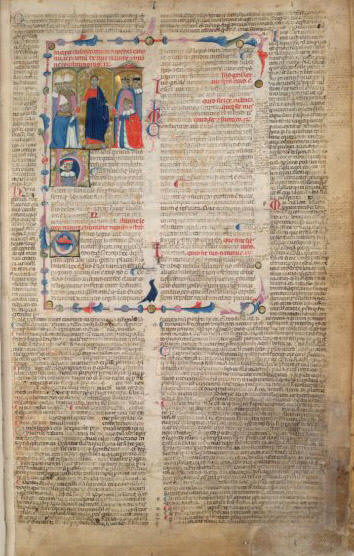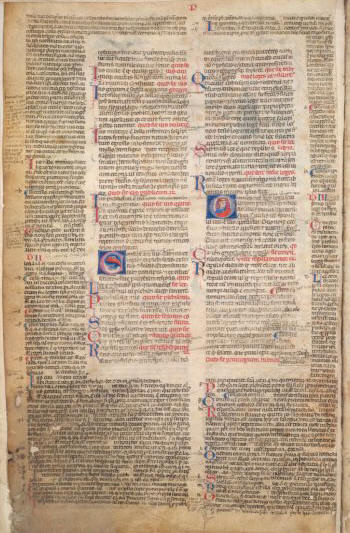Gratian's Decretum with the Ordinary Gloss of Bartholomaeus Brixiensis (ca. 1250 A.D.)

Bologna, Collegio di Spagna, 281, fol. 1r

Bologna, Collegio di Spagna, 281, fol. 1v
|
Gratian's Decretum with the Ordinary Gloss of Bartholomaeus Brixiensis (ca. 1250 A.D.) Bologna, Collegio di Spagna, 281, fol. 1r
Bologna, Collegio di Spagna, 281, fol. 1v |
D.5 dictum before c.1: Now, let us return to the difference between natural law and other laws. Natural law receives first place among all others because of it s age and dignity. For it began with the appearance of rational creatures and does not change over time, but remains immutable. |
| D.6 dictum after c.3: Customary law began after natural law when people began to gather as one and live together. | |
| D.8 dictum before c.1: Natural law differs from custom and enactment. By natural law all things are common to all people . . . So Plato lays out the order for a very just commonwealth where no one considers anything his own. | |
| D.8 dictum after c.1: Now natural law similarly prevails by dignity over custom and enactments. | |
| Gloss to D.1 c.1: "is moral": that is, it is equitable when there is a reason and the passing through does not disturb another . . . Again, by divine law it is permissible to eat grapes in another's field but not to take them away. | |
| D.9 dictum after c.11: Since therefore nothing is ordered by natural law unless God wishes it, and nothing is forbidden unless God forbids it, and since everything in the canonical scriptures is divine ordinance, divine ordinance is indeed consonant with nature. | |
| D.10: Ecclesiastical law is superior to secular law | |
| D.11-D.12: Ordinances abrogate or derogate custom |